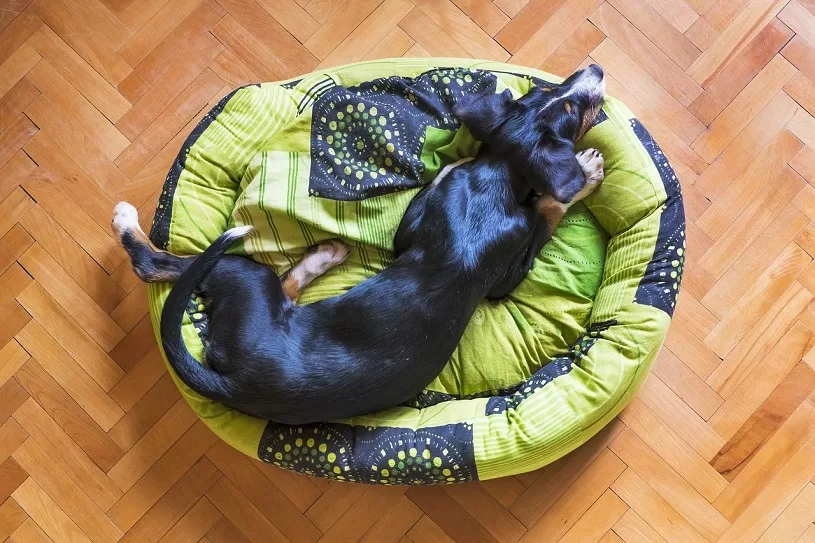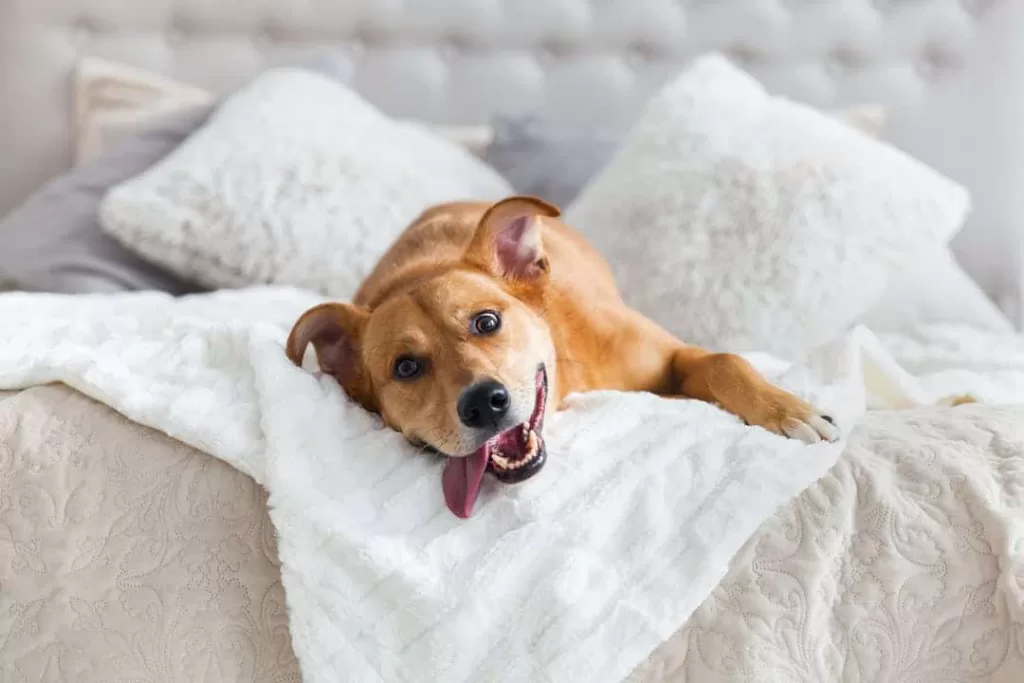How to Calm a Restless Dog at Night? We understand that when your furry friend is restless, it not only affects their well-being but also disrupts your own sleep patterns and overall peace of mind.
Table of Contents
Anxiety in dogs can manifest itself in a variety of ways, such as excessive barking, pacing, throwing, or destructive behavior. But don’t worry, because, with the right approach and a little patience, you can help your dog find peace on those restless nights.
In this blog, we’ll look at several tried and true methods that can help you create a soothing environment for your four-legged friend. From establishing a consistent routine to providing comfort through calming techniques, we’ll explore the many approaches that can make a significant difference in your dog’s sleep patterns.
There are a few things that can help calm a restless dog at night. One is to provide a safe and secure environment for the dog while you sleep. This can be done by keeping the room dark and providing an escape route if the dog becomes agitated.
Another thing to consider is whether or not you should offer water or food to your dog when they become restless.
10 Ways to Calm a Restless Dog at Night?

No matter how many times you tell your dog to lie down, she will not listen. She is always up and moving around, making it difficult for you to rest.
Here are some tips to help calm your restless dog at night:
1. Create a calm environment.
Make sure your dog’s sleeping area is quiet and peaceful. This means no loud music, TV, or other noise that could disturb your dog’s sleep.
As we know dogs will have a very high hearing power, so even a minute sound also may wake them up from deep sleep. So, it is advisable to create a space that is partially soundproof or away from regular sounds.
2. Establish a bedtime routine.
Help your dog wind down for the night by establishing a bedtime routine. This might include things like brushing their teeth, going for a last potty break, and reading a bedtime story.
A strict timetable is always good for any living being especially humans and dogs, which provides good health and hygiene.
Here’s a chart outlining an ideal bedtime routine for dogs to help them sleep better:
| Time | Activity |
|---|---|
| 7:00 PM | Evening walk |
| 7:30 PM | Dinner |
| 8:00 PM | Playtime and mental stimulation |
| 8:30 PM | Calming activities (e.g., gentle brushing) |
| 9:00 PM | Last potty break |
| 9:15 PM | Dim the lights and create a calm environment |
| 9:30 PM | Bedtime |
| Overnight | Ensure a comfortable sleeping area |
| Morning | Wake up and morning routine |
Also Read: Why Is My German Shepherd Sitting On My Lap?
3. Keep the lights low.
Dim the lights in your home in the evening to signal to your dog that it’s time to start winding down for the night.
An effective technique to help calm a restless dog at night is to dim the lights in your home. Dogs are very sensitive to light and bright lights can stimulate their senses and make it difficult for them to relax and sleep. By creating a dimly light environment, you can encourage your dog to calm down and enter a more peaceful state.
Remember, every dog is unique and what works for one may not work for another. Observe your dog’s behavior and adapt the lighting conditions accordingly. The goal is to create a calm and comfortable environment that promotes relaxation and encourages your restless dog to sleep soundly at night.
4. Give your dog a massage.
A relaxing massage can do wonders for a restless dog. Just be sure to use gentle pressure and avoid any sensitive areas.
Just like humans, dogs benefit from the calming and stress-relieving effects of a gentle massage. It not only promotes physical relaxation but also strengthens the bond between you and your furry friend.
5. Try aromatherapy.
Certain calming scents used in aromatherapy can help relaxation. You can try a dog-safe essential oil diffuser or simply rub some lavender oil on your dog’s bedding.
Aromatherapy is a valuable technique for calming a restless dog and promoting a good night’s sleep. Some scents have soothing properties that help relax the mind and body for both humans and dogs. However, it is important to note that not all essential oils are safe for dogs, as some are toxic. Always consult with a veterinarian before introducing aromatherapy to your dog’s routine.
6. Provide toys and chews.
Give your dog something to do at night by providing them with toys and chews. This will help keep them occupied and help prevent boredom.
7. Exercise during the day.
Make sure your dog gets plenty of exercise during the day. A tired dog is often a calm dog at night.
Regular exercise during the day can indeed contribute to better sleep for dogs. Here’s a chart outlining an ideal exercise routine for dogs:
| Time | Activity |
|---|---|
| Morning | Morning walk or jog |
| Afternoon | Active playtime (fetch, agility training, etc.) |
| Evening | Evening walk or moderate exercise |
Here’s a breakdown of each activity:
- Morning Walk or Jog: Start the day with a brisk walk or jog to give your dog physical exercise and mental stimulation. This activity helps them burn off energy and sets a positive tone for the day.
- Active playtime: During the afternoon, engage in activities that require physical activity, such as playing fetch, participating in agility training, or running with your dog. It helps to de-stress and stimulate them mentally.
- Evening Walk or Moderate Exercise: In the evening, take your dog for another walk or engage in moderate exercise. This activity helps them burn off any remaining energy before bed.
It’s important to note that dogs’ exercise needs can vary based on factors such as breed, age and health conditions. Consult your veterinarian to determine the appropriate amount and type of exercise for your particular dog. Additionally, make sure your dog has access to water and shade during outdoor activities, especially in hot weather, to prevent overheating.
8. Avoid food and water before bed.
You might need to limit your dog’s food and water intake before bedtime to avoid accidents during the night.
9. Keep them close.
If your dog is struggling to settle down, try keeping them close by. This might mean sleeping in the same room or simply keeping them close by while you’re relaxing in the evening.
10. Talk to your veterinarian.
If your dog is still having trouble settling down at night, it might be time to talk to your veterinarian. They can rule out any medical conditions that might be causing the problem and offer additional advice.
What causes restlessness in dogs at night?
Here’s a chart outlining some common causes of restlessness in dogs at night:
| Cause | Description |
|---|---|
| Physical discomfort | Pain, discomfort, or illness can cause restlessness in dogs. |
| Anxiety or stress | Dogs may experience anxiety or stress, leading to restlessness. |
| Lack of exercise or mental stimulation | Insufficient physical exercise or mental stimulation during the day can result in pent-up energy at night. |
| Environmental factors | Noises, temperature changes, or unfamiliar surroundings can disrupt a dog’s sleep. |
| Noise, temperature changes, or unfamiliar surroundings can disrupt a dog’s sleep. | Dogs may become restless if they need to relieve themselves. |
| Aging or cognitive decline | Older dogs may experience restlessness due to age-related conditions such as dementia. |
| Poor sleep environment | Uncomfortable bedding, noisy surroundings, or inadequate temperature can contribute to restlessness. |
| Medication side effects or health issues | Certain medications or underlying health issues can affect a dog’s sleep patterns. |
If your dog is restless at night, there could be a number of reasons why. It could be something as simple as your dog being too hot or too cold, or it could be a sign of something more serious, like anxiety or a medical condition.
If your dog is restless at night, the first thing you should do is check their temperature to see if they’re too hot or too cold. If they’re too hot, they may be panting and trying to find a cool spot to lie down. If they’re too cold, they may be shivering and trying to find a warm spot. If you can’t find a comfortable temperature for your dog, it’s best to consult your veterinarian.
If your dog is restless at night and their temperature is normal, it could be a sign of anxiety. Dogs can experience anxiety for a number of reasons, including separation anxiety, fear of loud noises, and fear of unfamiliar people or places. If you think your dog may be anxious, talk to your veterinarian about possible treatment options.
If your dog is restless at night, there are a number of things you can do to help them feel more comfortable. You can try providing them with a comfortable bed or crate, playing calming music, or using a pet-safe calming diffuser. You can also talk to your veterinarian about possible medications or supplements that may help your dog relax.
Conclusion
In conclusion, there are a few things you can do to calm a restless dog at night.
- First, try to create a comfortable environment for your dog by providing them with a lit space and toys that they can play in.
- Second, be sure to keep your dog quiet and off-balance by playing games or reading stories at bedtime.
- Finally, make sure to give your dog enough exercise to help them relax and clear their mind.

